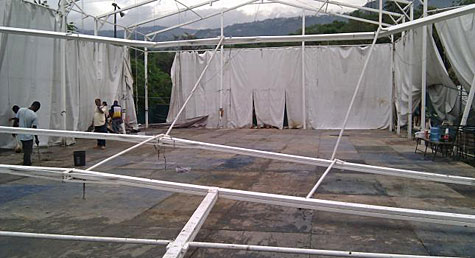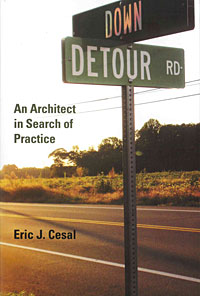
WUSTL alumnus Eric Cesal, who directs design and reconstruction initiatives in Haiti for Architecture for Humanity, will speak about his work Oct. 20.
Architect Eric Cesal, a Washington University alumnus who is now directing design and reconstruction initiatives in Haiti for the group Architecture for Humanity, will return to campus to discuss his work at noon Wednesday, Oct. 20.
The talk, titled Starting From Zero: How Haiti Can Save Architecture, is presented by the Sam Fox School of Design & Visual Arts as its annual Eugene J. Mackey Jr. Lecture, part of the school’s fall Public Lecture Series.
The event is free and open to the public and will take place in Kemp Auditorium, located in Givens Hall, near the intersection of Forsyth Boulevard and Hoyt Drive. For more information, call (314) 935-6200 or visit samfoxschool.wustl.edu.
Architecture and disaster response
“In a post-disaster context, there are two mentalities that operate,” says Cesal, who arrived in Haiti last March, roughly six weeks after the earthquake. “There is an aid mentality, which addresses immediate needs by distributing food, tents and medicine. There is also a development mentality, which looks at things like education, building infrastructure and building codes. A development mentality believes that the best way to address a disaster is to prevent the next one.
“In the immediate aftermath of a disaster, the aid mentality dominates, and this has become the traditional pretext for arguing that architects have no place in disaster response,” Cesal says. “This is clearly something that we, at Architecture for Humanity, don’t believe — I think because of the special way that we look at development. We want to help put the country back on its feet so that in the future it can address its own disasters.
“We believe that the earlier you start thinking about development, the better and faster your results come about,” Cesal says. “So within 48 hours of the quake, Architecture for Humanity had already formulated a plan, in broad strokes, about what its response was going to be. We didn’t do this because we believed that we already had all the answers — no one did. We did it because we believe that in order to promote long-term development, you have to be there early. You have to be thinking, you have to be acting.”
 Eric Cesal
Eric Cesal
A native of Washington, D.C., Cesal completed his undergraduate studies at Brown University. He then spent time in professional practice in Washington before earning three degrees from Washington University in 2008: a master of architecture, a master of construction management and a master of business administration.
Cesal joined Architecture for Humanity in 2006, serving as a volunteer in Biloxi, Miss., in the wake of Hurricane Katrina. The following year, he completed a second stint, this time in New Orleans, working in the Lower 9th Ward. He joined Architecture for Humanity fulltime earlier this year and now lives in Port-au-Prince, from where he manages and coordinates the group’s Haiti ground operations.
In addition to his work with Architecture for Humanity, Cesal is the author of Down Detour Road: An Architect in Search of Practice (MIT Press, 2010), which tracks his attempts to locate new architectural values in a time of economic crisis.
The Eugene J. Mackey Jr. Lecture
The Eugene J. Mackey Jr. Lecture honors a distinguished graduate who practiced in St. Louis in partnership with former Dean Joseph Murphy, and brings significant patrons of architecture to the school. Recent Mackey lecturers have included Gerald Edelman, Thomas Krens, Jorma Ollila, Emily Pulitzer and Richard Jackson.